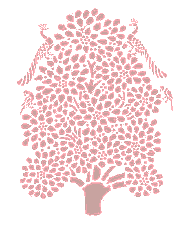|

VEDIC
SCRIPTURES
A Song of Fortune
- A modern Gîtâ -


CHAPTER 14
The three basic
qualities of nature

(1) The
supreme
personality
of the opulence said:
'Let me again tell you about that filognosy ruling over all knowledge,
which is the first and best, and by the power of which the sages
attained all the transcendental perfection there is to attain. (2)
Taking shelter of this spiritual knowledge, having attained the same
as what I all am, one is not even born again at the time of creation,
nor disturbed when annihilation takes place.
(3) My channel of birth is the greater of nature
and from the supreme spirit in it, I create everywhere the conditions
for the living beings to exist, oh child of Many. (4) Oh son of Alice,
of
all the species of life, of all the forms that manifested, I am the
grand primal source, the absolute spirit, the father who gives the
seed. (5) Goodness, passion and ignorance are the qualities resulting
from this material nature which conditions, oh man of grip, the body of
the one embodied. (6) Goodness is the purest of these qualities, it
inspires to bloom free from reactions, and links the filognosy, the
love of knowledge for the completeness, to the condition of happiness,
oh sinless one. (7) You should know that the quality of passion is
marked by desires resulting from attachment and longing; it is from
them that the one embodied gets entangled in the consequences of what
he did in the past, oh son of Alice. (8) The quality of ignorance
deluding all living beings is that what follows a lack of knowledge:
the negligence, indolence and sleepiness which tie one down, oh son of
the Many dynasty.
(9) Goodness binds to knowledge, passion binds to
profit-minded labor, but by the ignorance which covers the knowledge
one is bound to errors. (10) With the modes of goodness, passion and
ignorance it is so that, oh son of Many, at one time goodness prevails
defeating passion and ignorance, then passion overrules goodness and
ignorance, and then again ignorance is most prominent relative to the
goodness and the passion. (11) The goodness is strongest when in
relation to all of the, what one calls, gates of the body - or to all
the senses and their organs - the light of knowledge develops.27 (12) Oh best of the Many line, when passion
dominates, all kinds of symptoms develop like greed, overexertion,
unsolicited action and uncontrollable desire. (13) When the quality of
ignorance is prominent it is murkiness, passivity, carelessness and
even madness that manifests, oh son of the Laborer family.
(14) Finding destruction the one embodied who
gained in strength to the mode of goodness, attains the world of those
great in wisdom and purity. (15) When one finds destruction in passion,
life is resumed among those motivated for the profit; likewise the one
who ended in ignorance is of a new life among the ignorant. (16) Of
virtuous deeds in the mode of goodness one finds the result of
purification, so one says, but the result of passion is misery, while
the result of ignorance consists of illusion. (17) From goodness one
finds the development of knowledge, from passion greed develops
and from ignorance a lot of nonsense is found. (18) Situated in
goodness one rises up, in passion one stays in between and in ignorance
being of an abominable quality one goes down. (19) A seer who knows of
the supreme in relation to the qualities, and as well correctly sees
that the doer is no other than these three qualities to the modes of
nature, is promoted to my spiritual nature. (20) Going beyond these
qualities the one embodied will enjoy the nectar of being freed from
the distressing physical consequences of starting a new life, of being
old and of finding one's end.'
(21) Aylen said: 'Oh master of wisdom, by which
symptoms is the one rising above these three qualities recognized, how
does he behave and how does this going beyond the three modes take
place?'
(22-25) The fortunate one said: 'He who doesn't hate
the developing or not developing of enlightenment, of material progress
and of the confusion to the modes, oh son of Gwen; he who from the
neutral never desires nor is agitated when the modes are acting upon
him; he who, unwavering remembering himself, thus keeps his position
being equal in distress and happiness and is indifferent whether it
concerns a clod, a stone or a lump of gold; he who is the same towards
what is popular and what is unpopular, and is steady and equal in being
praised or defamed; he who is equal in honor and dishonor and is equal
towards both the sides of friends and enemies and manages to renounce
with whatever he does, he is said to be transcendental to the modes.
(26) And he who, relating to me, never fails to be united in devotion
and voluntarism; he, transcending all of the modes, will rise to the
spirit of the absolute. (27) For I am the spiritual foundation of the
imperishable, immortal, eternal and original nature as also the
ultimate happiness.'


2007 © Aadhar, Enschede
Commercial use requires permission
|





